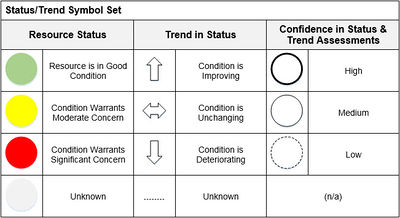Difference between revisions of "2017 Knowledge Assessment"
Cellsworth (Talk | contribs) |
Cellsworth (Talk | contribs) |
||
| Line 156: | Line 156: | ||
|style="color:#000;"| | |style="color:#000;"| | ||
| − | *'''Archaeological and Cultural Resources:''' | + | *'''Archaeological and Cultural Resources:''' Balsom and Dierker |
| − | *'''Humpback Chub: ''' | + | *'''Humpback Chub: ''' Charles Yackulic, Randy Van Haverbeke, Kirk Young |
*'''Hydropower and Energy:''' Craig Ellsworth, Shane Capron, Clayton Palmer, Dave Welker, Chrystal Dean (WAPA); Paul Davidson and Nick Williams (Reclamation); Lucas Bair (GCMRC); Leslie James (CREDA); Cliff Barrett (UAMPS); Jenika Raub (SRP); Ben Reeder (SEAHG chair); Peggy Roefer (CRC); Arash Moelemi (NTUA) | *'''Hydropower and Energy:''' Craig Ellsworth, Shane Capron, Clayton Palmer, Dave Welker, Chrystal Dean (WAPA); Paul Davidson and Nick Williams (Reclamation); Lucas Bair (GCMRC); Leslie James (CREDA); Cliff Barrett (UAMPS); Jenika Raub (SRP); Ben Reeder (SEAHG chair); Peggy Roefer (CRC); Arash Moelemi (NTUA) | ||
| Line 176: | Line 176: | ||
*'''Water Quality:''' Robert Radtke, Marianne Crawford, Katrina Grantz (Reclamation); Bridget Deemer, Charles Yackulic, Nicholas Voichick (USGS); Peggy Roefer (NV CRC); Todd Tietjen (SNWA); Mark Anderson (NPS) | *'''Water Quality:''' Robert Radtke, Marianne Crawford, Katrina Grantz (Reclamation); Bridget Deemer, Charles Yackulic, Nicholas Voichick (USGS); Peggy Roefer (NV CRC); Todd Tietjen (SNWA); Mark Anderson (NPS) | ||
| − | *'''Aquatic Food Base:''' | + | *'''Aquatic Food Base:''' Ted Kennedy, Jeff Muehlbauer, Chris Budwig, Shane Capron, Bill Davis, Craig Ellsworth |
|} | |} | ||
Revision as of 15:28, 5 April 2017
|
|
2017 Knowledge AssessmentKnowledge assessments are a standard tool in adaptive management, with two purposes: (1) They assess the state of knowledge concerning:
(2) They identify areas of uncertainty in this knowledge that the adaptive management team may want to address through additional investigations, including but not limited to field monitoring or research. The present (FY 2017) knowledge assessment is timed to coincide with and inform the Annual Reporting process and development of the next GCDAMP Triennial Work Plan for FY 2018-2020. This knowledge assessment is testing a methodology for better organizing, displaying, and communicating its findings, potentially to carry forward to guide future knowledge assessments as well. [1] |
| -- |
-- |
-- |
|---|
|
|
